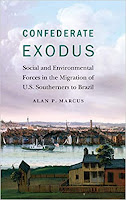New Arrival:
• Confederate Exodus: Social and Environmental Forces in the Migration of U.S. Southerners to Brazil by Alan P. Marcus (Univ of Neb Press, 2021).
Failed revolutions and rebellions often result in some proportion of the losing side's leadership and population leaving the country voluntarily or through forcible expulsion. Outright banishment abroad was not a significant consequence of the American Civil War, but many ex-Confederates and their families did leave the country to seek new lives elsewhere in the Americas. The adventures of ex-Confederates in Mexico amid that country's own internal strife have been most highly popularized, even romanticized, but Brazil proved to be the settlement destination of the greatest number. According to Confederate Exodus: Social and Environmental Forces in the Migration of U.S. Southerners to Brazil: "Following the U.S. Civil War an estimated ten thousand Confederates left the U.S. South, most of them moving to Brazil, where they became known as “Confederados,” Portuguese for “Confederates.” These Southerners were the largest organized group of white Americans to ever voluntarily emigrate from the United States."
Ideological compatibilities are discussed, but, as the subtitle suggests, Confederate Exodus also shows how the "agricultural, social, and economic" conditions in Brazil made the South American country appealing to transplanted Southerners and the immigrants welcome to Brazilians. In seeking answers to questions such as "Why Brazil? What was the life of an American immigrant in Brazil like? Where did U.S. Southerners settle in Brazil? Which settlements failed, and why?" and "Why was Santa Barbara the settlement that thrived best in Brazil?," Alan Marcus (who selected Brazilian migration for his doctoral work) "examines the various factors that motivated this exodus, including the maneuvering of various political leaders, communities, and institutions as well as agro-economic and commercial opportunities in Brazil. Marcus considers Brazilian immigration policies, capitalism, the importance of trade and commerce, and race as salient dimensions."
I'll admit to being not at all familiar with any aspect of the study of Southern colonies in Brazil, but certain titles at the very least ring a bell, among them Eugene Harter's The Lost Colony of the Confederacy (1985) and The Confederados: Old South Immigrants in Brazil (1995) edited by Cyrus and James Dawsey. Interestingly, Marcus's current estimates of ex-Confederate emigre numbers to South America are much lower than the big top-end numbers suggested by Harter's much earlier research. According to Marcus, a major influence on his own scholarly direction that eventually became Confederate Exodus was Laura Jarnagin's A Confluence of Transatlantic Networks: Elites, Capitalism, and Confederate Migration to Brazil (2008).
In addition to examining the many motivating factors referenced above, Marcus's study "also provides a new synthesis for interpreting the Confederado story and for understanding the impact of the various stakeholders who encouraged, aided, promoted, financed, and facilitated this broader emigration from the U.S. South."


No comments:
Post a Comment
***PLEASE READ BEFORE COMMENTING***: You must SIGN YOUR NAME ( First and Last) when submitting your comment. In order to maintain civil discourse and ease moderating duties, anonymous comments will be deleted. Comments containing outside promotions, self-promotion, and/or product links will also be removed. Thank you for your cooperation.